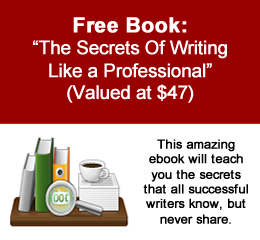 All writers know that if they are to stand any chance of successfully pitching their book to an agent or publisher, their book needs to be perfect (or as close to perfect, as possible). To do this, a writer must learn how to self-assess their own work. This article looks at why self-editing is so important and offers tips on ways to produce the best results.
All writers know that if they are to stand any chance of successfully pitching their book to an agent or publisher, their book needs to be perfect (or as close to perfect, as possible). To do this, a writer must learn how to self-assess their own work. This article looks at why self-editing is so important and offers tips on ways to produce the best results.
Stiff competition makes self-editing essential
Agents and publishers are inundated with manuscripts on a daily basis. In fact, they see so many manuscripts, and have so few publishing slots available, that they are in fact looking for reasons to say no, not yes. It is easier for an agent/publisher to discover fault with a book and find an excuse to reject, than it is to say yes. This means that it is your duty, as a writer, to give the agent/publisher no reason to say no!
In reality this means getting the basics right. Correctly identifying your book’s genre, and precisely targeting the correct agent/publisher is a good start. However, standing out from the crowd of manuscripts can be difficult.
This puts agents/publishers in a very strong position. A few years ago, you would often hear of an agent/publisher working closely with an author. They would nurture the writer, working on the novel, moulding it into shape. However, these days are quickly disappearing. For an agent/publisher, any time spent editing a book simply costs money, and cuts into profits. (You could blame booksellers insisting on major discounts for this position, but that is another blog post.) As it stands any time spent working with a writer, is time that could be spent publishing books or negotiating deals. The result is that agents/publishers are looking for books that are as close to ‘publication ready’ as possible.
This means that a well edited book, which needs little in-house editing input, is a very interesting prospect for any publisher. Therefore, all other things being equal, a well edited book stands a far better chance of publication over a book that needs work.
This may not be fair, and may not be good for the industry, but it is the current situation. It means that it has become a writer’s duty to make their book as close to ‘publication ready’ as possible.
Understanding the editing process is key
If your book was to be prepared for publication by a publishing house, it would pass through a four editing steps process prior to printing.
- Structural editing,
- Stylistic editing,
- Copy editing,
- Proofreading,
The aim is simply to produce a book that is accessible and readable. Yet, the editing process is as much an art as a science and includes a large amount of ‘gut feel’. This said self-editing (and even professional editing) hangs around three key questions. These questions are constantly posed in the editor’s mind (be that the writer or a third party). Only by consistently applying these questions can a good edit be performed.
- Is the book’s organisation and content suitable for the intended audience, medium, market, and purpose? [Structural]
- How can the book’s meaning be clarified, the flow improved and the language smoothed?[Stylistic]
- Have you ensured the correctness, consistency, accuracy, and completeness of the document? [Copy]
Tips for self-editing
This post about editing your own novel gave some solid outlines on which to build your self-edit. However, as an addition I wanted to offer some boarder advice.
Perhaps the biggest problem writers face, when editing their own work, is simply getting too close. Even when holding the questions listed above in your mind, writers can still find it just too hard to detach themselves. But this is understandable, in fact I would go as far as saying this is essential. Just how a writer detaches themselves from the tangle of their own narrative is hard to explain and I suspect it is very personal skill. I would be interested to hear any writer’s experiences or tips on doing just this.
The essence of any COPY edit is grammar and spelling but this is NOT an edit. An edit is so much more. It is important that a writer avoids becoming obsessed with spelling. Yes, spelling is important, and yes you must be as accurate as possible. However, grammar is just part of the puzzle. A good edit consists of all three questions listed above – spelling is just one aspect.
One potentially powerful option open to writers is to use friends and family to help with the edit. My advice here is clear. Firstly, be very precise with friends and family in just what you require from them. They can act as great proofreaders, but if this is the job you want them to carry out, then be clear. Tell them all you want is feedback on grammar and spelling only. Secondly, be selective about what you implement from friends and family feedback. Even the best intentioned feedback can be damaging and ill advised. Be prepared to listen, but also be prepared to ignore. After all, it is your book.
My penultimate snippet of advice is to consider professional help. Of course you would expect that kind of advice from a professional editing company, but I say it with the best of intentions. If you want your book to be the best it can possibly be, then a professional edit will help you to do just that. Yes, I agree that a writer having to pay to help get their book published is not a great situation for the industry, but that it is the situation that exists today. After all, agents/publishers see books as products, so you, as a writer, should also. Once you have this mind set, you can begin to see why gaining professional help to make your product saleable is just sound business practice.
Finally, I offer one last piece of advice. Don’t pitch your book too early. A poor pitch will result in rejection. Most agents keep track of the submissions they receive and once they have rejected a book, they will not look at it again. So, please, please, resist the temptation to submit early, and take that extra few weeks to make sure everything is just right.
I would be interested in reading your own tips, hints and experiences of self-editing. Just pop them in the comments.
Post Footer automatically generated by Add Post Footer Plugin for wordpress.

